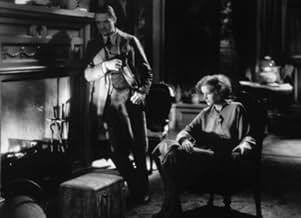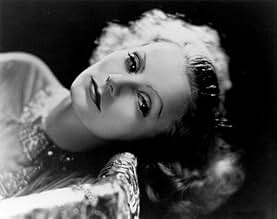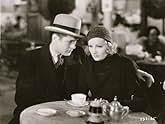Füge eine Handlung in deiner Sprache hinzuYvonne is a beautiful model who loves frequenting the Parisian bohemian life, because she loves hobnobbing with artists.Yvonne is a beautiful model who loves frequenting the Parisian bohemian life, because she loves hobnobbing with artists.Yvonne is a beautiful model who loves frequenting the Parisian bohemian life, because she loves hobnobbing with artists.
- Regie
- Drehbuch
- Hauptbesetzung
- Auszeichnungen
- 1 wins total
Clara Blandick
- Madeleine's Mother
- (Nicht genannt)
Sidney Bracey
- Waiter with Coffee and Cream Pitchers
- (Nicht genannt)
Empfohlene Bewertungen
Don't get me wrong. I love both Garbo and Montgomery. They are both very talented and extremely sexy. This film, however, was not. As the previous poster has said, there is NO chemistry between the 2 stars. It was as if they were not even in the same movie.
Montgomery looked very bored with it all, and, although very dapper in his tuxedo, looked as though he were going to fall asleep throughout the film. I had to laugh when he WAS asleep in the last scene and never woke up, credits rolling. Looks like the poor thing finally got his nap after all. Still, he's always wonderful to look at!
The same goes for Garbo, only this time, her slow talking got on my nerves not just a little bit. I loved her outfits, and she could definitely be a model, but her speech was simply too languid for the film. Even Bob spoke slowly. What the hell?
The supporting players were given awful dialog, stock characterization, and no substance whatsoever, thus making no impact. All this accomplished was to get screen time away from the 2 stars, thankfully, I suppose. (The little doggie was cute, though.)
Nobody looked as though they had any enjoyment making this film, and the same can be said for the unfortunate viewer.
Bottom line: lovely to look at, painful to follow through.
Montgomery looked very bored with it all, and, although very dapper in his tuxedo, looked as though he were going to fall asleep throughout the film. I had to laugh when he WAS asleep in the last scene and never woke up, credits rolling. Looks like the poor thing finally got his nap after all. Still, he's always wonderful to look at!
The same goes for Garbo, only this time, her slow talking got on my nerves not just a little bit. I loved her outfits, and she could definitely be a model, but her speech was simply too languid for the film. Even Bob spoke slowly. What the hell?
The supporting players were given awful dialog, stock characterization, and no substance whatsoever, thus making no impact. All this accomplished was to get screen time away from the 2 stars, thankfully, I suppose. (The little doggie was cute, though.)
Nobody looked as though they had any enjoyment making this film, and the same can be said for the unfortunate viewer.
Bottom line: lovely to look at, painful to follow through.
Inspiration (1931)
** 1/2 (out of 4)
A beautiful model (Greta Garbo) begins dating a good, shy guy (Robert Montgomery) but things hit hard times when he learns of her rather sluttish past. Once again Garbo is quite good and Montgomery is strong but the story lets both of them down. Things start off quite nice and move well but at the 45-minute mark things just fall apart because the story keeps repeating itself. He forgives her, learns something else, hates her, forgives her, learns something else and hates her again. A nice ending almost saves the film but not quite.
Romance (1930)
** (out of 4)
An Italian opera diva (Greta Garbo) with a troubled past falls in love with a priest (Gavin Gordon). Like many early sound films this one here talks and talks and talks but sadly most of the talk isn't very interesting. Garbo is very good in her role, although it's a bit hard to believe her as an opera star. Gordon on the other hand is fairly weak and it's a shame Garbo couldn't get Gary Cooper like she wanted. The ending is so incredibly bad you can't help but laughs but hey, there's Garbo.
** 1/2 (out of 4)
A beautiful model (Greta Garbo) begins dating a good, shy guy (Robert Montgomery) but things hit hard times when he learns of her rather sluttish past. Once again Garbo is quite good and Montgomery is strong but the story lets both of them down. Things start off quite nice and move well but at the 45-minute mark things just fall apart because the story keeps repeating itself. He forgives her, learns something else, hates her, forgives her, learns something else and hates her again. A nice ending almost saves the film but not quite.
Romance (1930)
** (out of 4)
An Italian opera diva (Greta Garbo) with a troubled past falls in love with a priest (Gavin Gordon). Like many early sound films this one here talks and talks and talks but sadly most of the talk isn't very interesting. Garbo is very good in her role, although it's a bit hard to believe her as an opera star. Gordon on the other hand is fairly weak and it's a shame Garbo couldn't get Gary Cooper like she wanted. The ending is so incredibly bad you can't help but laughs but hey, there's Garbo.
Many (perhaps too many) of Garbo's films are rated primarily on the basis of her performance, with everything else secondary. This is most unfortunate, since MGM - very much to their credit - did not arrange her pictures primarily as star vehicles: the leading men and supporting players are usually strong performers. Considering the fairly large number of pictures in which she starred, her performances do not encompass a wide variety of characterizations: she is typically a woman who has loved well but not wisely (and probably too often), a worldly and world-weary femme fatale preoccupied with the futility of searching for real happiness, yet finding no viable alternative in the life she knows.
This is once again her character in "Inspiration," a relatively obscure Garbo film which compares very favorably with the later and much better-known "Camille." The stories have much in common, as do her performances. While "Camille" obviously had a considerably larger budget, resulting in more impressive production values, the dramatic values in "Inspiration" are at least equal to those of the other.
Of particular note: Garbo, dismissed by her lover, huddles in a storefront, waiting for him to pass on a dark, rainy day - finally emerging when she spots him, only to be rejected once again - without a word - with nothing more than a curt shake of the head as he walks on.
And Lewis Stone, having ended the liason with his young, despairing mistress in an upper apartment, descends the staircase, pauses ever so briefly at the building entrance to note her lifeless body now crumpled on the sidewalk, and continues on his way.
This is once again her character in "Inspiration," a relatively obscure Garbo film which compares very favorably with the later and much better-known "Camille." The stories have much in common, as do her performances. While "Camille" obviously had a considerably larger budget, resulting in more impressive production values, the dramatic values in "Inspiration" are at least equal to those of the other.
Of particular note: Garbo, dismissed by her lover, huddles in a storefront, waiting for him to pass on a dark, rainy day - finally emerging when she spots him, only to be rejected once again - without a word - with nothing more than a curt shake of the head as he walks on.
And Lewis Stone, having ended the liason with his young, despairing mistress in an upper apartment, descends the staircase, pauses ever so briefly at the building entrance to note her lifeless body now crumpled on the sidewalk, and continues on his way.
The plot of this film is very bland, but the plots of many of Garbo's films are very bland. People only really came (come) to her films for her. Her mystique, her sparkle, her aloof charm and her husky voice (or over-the-top mannerisms, if we're watching a silent film). In this one, she fails to deliver.
Basically, Garbo is a kept woman in this one. She serves as an artist's model, among other things. She meets Robert Montgomery at a party, and they fall in love and start an affair. The ending to this one is so moralistic it almost made me gag, but at least no one randomly died like they usually do in Garbo films, and at least she didn't decide that life was no longer worth living. However, I feel that the film would have been better had one of the leads died. I'm sorry to sound macabre, but it's true. (I believe there was one point in this film where somone did commit suicide).
Robert Montgomery plays the same character he always plays.
Bob and Garbo aren't a great match, and they don't have a lot of chemistry together. Someone like Norma Shearer or Joan Crawford would have worked better in this role, I think. For someone who was such a smashing success, how did Garbo manage to pick such bad films to star in? Did she just not want to be a movie star? In this film, she certainly feels like it.
Basically, Garbo is a kept woman in this one. She serves as an artist's model, among other things. She meets Robert Montgomery at a party, and they fall in love and start an affair. The ending to this one is so moralistic it almost made me gag, but at least no one randomly died like they usually do in Garbo films, and at least she didn't decide that life was no longer worth living. However, I feel that the film would have been better had one of the leads died. I'm sorry to sound macabre, but it's true. (I believe there was one point in this film where somone did commit suicide).
Robert Montgomery plays the same character he always plays.
Bob and Garbo aren't a great match, and they don't have a lot of chemistry together. Someone like Norma Shearer or Joan Crawford would have worked better in this role, I think. For someone who was such a smashing success, how did Garbo manage to pick such bad films to star in? Did she just not want to be a movie star? In this film, she certainly feels like it.
Cocktail circuit coquette trades in her lavish lifestyle for the sake of a more genuine attachment, the pursuit of which only seems to involve compromise, disappointment and despair. It's a philosophical little film suffused with romantic melancholy.
There are more famous films where Garbo says she wants to be alone, and where she laughs, but she does both here too. There's little in the way of action but it has a pleasing lilt as it shifts from high glamour to an almost expressionist gloom.
Two fine contrasting scenes - a sunny breakfast in the park and a snowy night - capture the mood of the transition between hope and resignation - and we get to see Garbo go from some of Adrian's most impressive creations to a dishevelled dressing gown.
Was saving this for a sleepless night and it went down a treat in the small hours when it was just me and the night and Garbo.
There are more famous films where Garbo says she wants to be alone, and where she laughs, but she does both here too. There's little in the way of action but it has a pleasing lilt as it shifts from high glamour to an almost expressionist gloom.
Two fine contrasting scenes - a sunny breakfast in the park and a snowy night - capture the mood of the transition between hope and resignation - and we get to see Garbo go from some of Adrian's most impressive creations to a dishevelled dressing gown.
Was saving this for a sleepless night and it went down a treat in the small hours when it was just me and the night and Garbo.
Wusstest du schon
- WissenswertesRelease of the movie was delayed because of a lawsuit Pathé brought against MGM. Although the novel by Alphonse Daudet was in public domain in the USA, it was still under copyright protection in Europe. Pathé won the lawsuit.
- Zitate
André Montell: But I'm doing all the talking - please lets talk about you.
Yvonne Valbret: There isn't much to tell - I'm just a nice young woman - not too young, and not too nice - I hope!
- VerbindungenAlternate-language version of Sapho (1934)
Top-Auswahl
Melde dich zum Bewerten an und greife auf die Watchlist für personalisierte Empfehlungen zu.
- How long is Inspiration?Powered by Alexa
Details
- Erscheinungsdatum
- Herkunftsland
- Sprache
- Auch bekannt als
- Inspiration
- Drehorte
- Produktionsfirma
- Weitere beteiligte Unternehmen bei IMDbPro anzeigen
Box Office
- Budget
- 438.000 $ (geschätzt)
- Laufzeit
- 1 Std. 14 Min.(74 min)
- Farbe
Zu dieser Seite beitragen
Bearbeitung vorschlagen oder fehlenden Inhalt hinzufügen





































